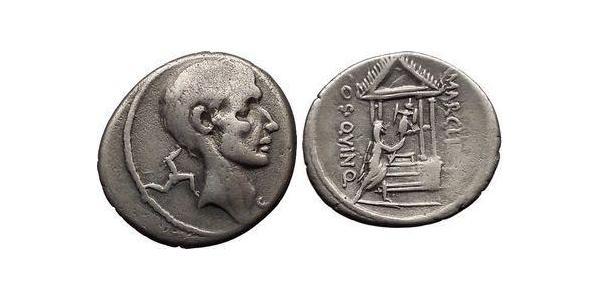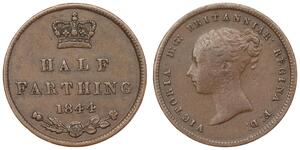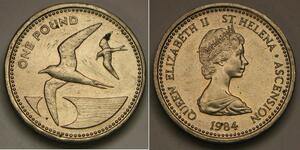[ 4061] P. Cornelius Lentulus Marcellinus moneyer Silver Denarius (20mm, 3.73 gm. 7h.), Rome , 50 B.C. Very Rare and Interesting. Reference: RSC Claudia 11; B.M.C. 4206; Syd. 1147; Craw. 439/1 Head of the consul, M. Claudius Marcellus right, [MARCELLINVS] before, triskelis behind. M. Claudius Mar. carrying trophy within tetrastyle temple, MARCELLVS on right, COS QVINQ on left. This type relates to two great events in the history of the moneyer's family, both connected with the career of M. Claudius Marcellus, the most illustrious of all who bore that name, and who was consul five times. He captured Syracuse in B.C. 211 and in B.C. 222 he had dedicated, in the temple of Jupiter Feretrius, the spoils he had taken from the Gaulish chief Britomartus, who he slew with his own hand. An ancestor of the moneyer with the name Claudius was adopted by the Cornelia gens. Provided with Certificate of Authenticity. CERTIFIED AUTHENTIC by Sergey Nechayev, PhD - Numismatic Expert Marcus Claudius Marcellus (ca. 268–208 BC), five times elected as consul of the Roman Republic, was an important Roman military leader during the Gallic War of 225 BC and the Second Punic War. Marcellus gained the most prestigious award a Roman general could earn, the spolia opima, for killing the Gallic military leader and king Viridomarus in hand-to-hand combat in 222 BC at the battle of Clastidium. Furthermore, he is noted for having conquered the fortified city of Syracuse in a protracted siege during which Archimedes, the famous inventor, was killed. Marcus Claudius Marcellus died in battle in 208 BC, leaving behind a legacy of military conquests and a reinvigorated Roman legend of the spolia opima. Early life: distinguished soldier and politician Little is known of Marcus Claudius Marcellus’ early years since the majority of biographical information pertains to his military expeditions. The fullest account of Marcellus’ life was written by Plutarch, a Roman historian. Plutarch’s collection, titled "Life of Marcellus," focuses on Marcellus’ military campaigns and political life, rather than being a full-life biography, as one might surmise from the title. Plutarch supplies some general information about Marcellus’ youth. Marcellus’ exact birth date is unknown, yet scholars are certain he was born prior to 268 BC because he earned his fifth and final Roman consulship in 208 BC, after he was 60. Marcellus was the first in his family to take on the cognomen of Marcellus, yet there are genealogical records of his family line tracing the cognomen all the way back to 331 BC. According to Plutarch, Marcellus was a skilled fighter in his youth and was raised with the purpose of entering military service. Marcellus’ general education may have been lacking. In his youth, Marcellus quickly distinguished himself as an ambitious warrior, known for his skill in hand-to-hand combat. He is noted to having saved the life of his brother, Otacilius, when the two were surrounded by enemy soldiers in Italy. As a young man in the Roman army, Marcellus was praised by his superiors for his skill and valor. As result of his fine service, in 226 BC, he was appointed the position of curule aedile in the Roman Republic. The position of curule aedile was quite prestigious for a man such as Marcellus. An aedile was an overseer of public buildings and festivals and an enforcer of public order. This is generally the first position one might take in seeking a high political career. The title of curule is quite peculiar because this distinction signifies that that person is a patrician, or upper classman, rather than a plebeian, or commoner. Marcellus was so highly regarded by his superiors that he was distinguished as a patrician, though technically his family was of the plebian class. Around the same time that he became an aedile, Marcellus was also awarded the position of augur, which Plutarch describes as being an interpreter of omens. By about the age of 40, M ...
Mehr...

|
Beigetragen von:
anonymous 2015-08-19 |
Similar Coin Groups

1/2 Fuang Kambodscha Silber Norodom (183 ...
Diese Gruppe hat 2 Münzen / 1 Preise
Add coin to this group

1 Stater Antikes Griechenland (1100BC-33 ...
Diese Gruppe hat 15 Münzen / 10 Preise
Add coin to this group

1/2 Cent Vereinigten Staaten von Amerika ...
Diese Gruppe hat 23 Münzen / 22 Preise
Add coin to this group

2/3 Thaler Fürstentum Ansbach (1398–1792 ...
Diese Gruppe hat 7 Münzen / 6 Preise
Add coin to this group
2025-06-14
- New coin is added to 1/2 Farthing Vereinigtes Königreich von Großbritannien und I ...
1/2 Farthing Vereinigtes Königreich von Großbritannien und I ...
Diese Gruppe hat 9 Münzen / 8 Preise
⇑
Great Britain - 1/2 Farthing 1844 - Victoria
2025-05-23
- New coin is added to 1 Pound St. Helena (1981 - ) / Ascension Silber Elizabeth II ...
1 Pound St. Helena (1981 - ) / Ascension Silber Elizabeth II ...
Diese Gruppe hat 5 Münzen / 2 Preise
⇑
SAINT HELENA & ASCENSION 1 Pound 1984 - Nickel-Brass - Elizabeth II. - XF -1798*
Das könnte Sie auch interessieren:










-300-150-YYnBwcI0woEAAAEnE4RaOLOG.jpg)

_Ascension-300-150-KtDBwcI0XgEAAAEoWKP7lK.O.jpg)






